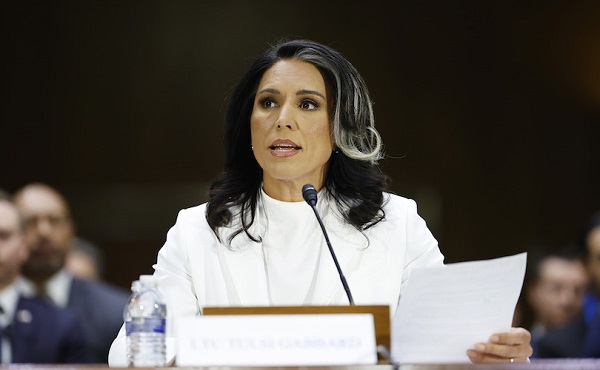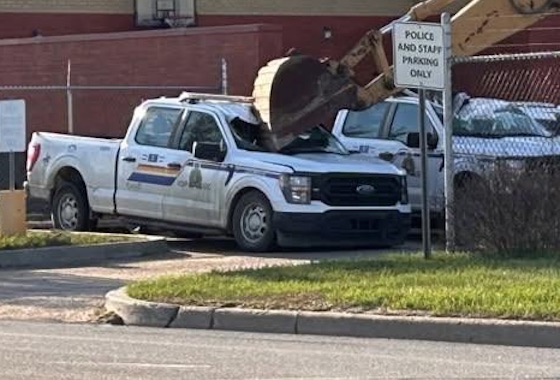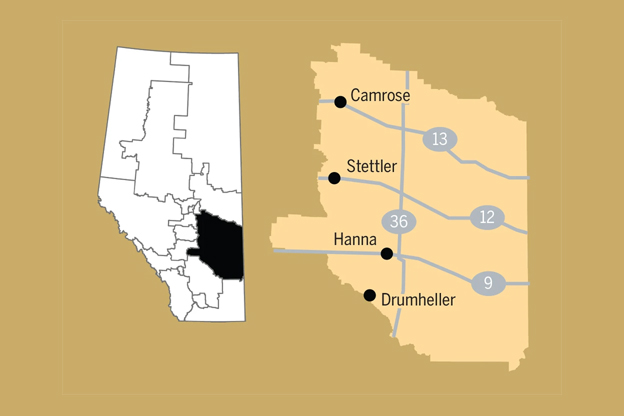COVID-19
The Rouleau Commission’s recommendations: Laundering the government’s agenda for censorship and expanded emergency powers
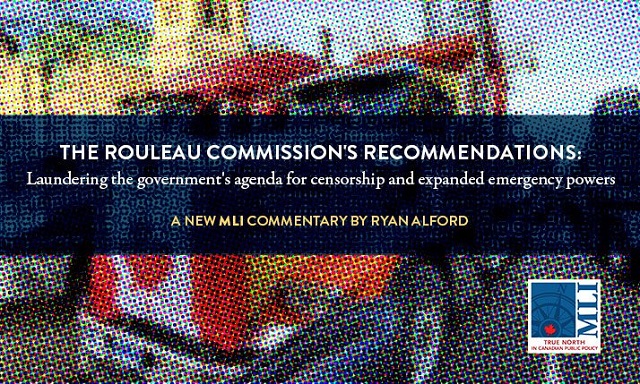
From the MacDonald Laurier Institute
By Ryan Alford
In this commentary, Ryan Alford examines how the Rouleau Commission’s personnel, agenda, and fundamental assumptions were all determined by Cabinet, the very body whose actions it was charged with assessing.
On August 31, Minister of Public Safety Dominic LeBlanc issued a six month progress report on implementing the recommendations of the Public Order Emergency Commission (POEC), also known as the Rouleau Inquiry. It is notable for what it explicitly notes as being implemented, and for what remains to be implemented without significant comment. That said, it would be an error to begin with a comparison between what the Final Report of the Rouleau Inquiry recommended and what the federal government is now implementing. Rather, the critical point of comparison is between the Order-in-Council establishing the Commission – that is, Commissioner Rouleau’s marching orders from the Government – and the legislative agenda that is now being pursued.
The Emergencies Act itself calls for a mandatory public inquiry into “the circumstances that led to the declaration [of an emergency] being issued and the measures taken for dealing with the emergency.” Before the POEC, civil libertarians had understood this to mean that the mandate of any inquiry would be to examine whether the government had a reasonable basis to conclude threats existed to national security that could not be dealt with under any other Canadian law, and whether the emergency measures taken by the cabinet conformed to the Canadian Charter of Rights and Freedoms. In short, it was always assumed the Inquiry would have a tight focus on whether a national emergency, as defined by law, existed and whether the declaration (and every action taken under it) had been constitutional.
That reassuring assumption proved unfounded. In the Order of April 25, 2022, the Governor General in Council, on the recommendation of the Prime Minister, redefined the meaning of the “circumstances that led to the emergency”, which now included “the impact, role and sources of misinformation and disinformation, including the use of social media”. It also directed the Commissioner to “make recommendations, as pertains to the matters examined in the Public Inquiry, on the use or any necessary modernization of [the Emergencies] Act”.
Thus, cabinet dictated the fundamental assumptions that guided the Rouleau Commission. Two of these assumptions stand out from the others. First, that misinformation and disinformation on social media had a significant impact on the organizers and participants of the Freedom Convoy. Second, that the Emergencies Act might need “modernization”. Both of these premises are highly problematic and should not have been granted at the outset of the hearings (i.e.: prior to the admission of any evidence).
The hearings phase provided ample demonstration of the spuriousness of these assumptions. Witness testimony reiterated that the concerns of Freedom Convoy protestors were practical and political in nature. Many had been directly affected by vaccine mandates that curtailed their ability to work and travel. Others expressed the view that these mandates had expanded the powers of government beyond what was acceptable. While these might not have constituted an indisputable justification for a sustained and disruptive protest, there was no evidence presented in the hearings that the Freedom Convoy protests were predicated chiefly, or even substantially, on social media-borne misinformation or disinformation.
Second, the only testimony from witnesses that supported the notion that the Emergencies Act needs to be modernized came from those closest to the heart of the federal government, namely the National Security and Intelligence Advisor to the Prime Minister and the Clerk and Deputy Clerk of the Privy Council Office (PCO). The documents, chiefly emails, expressing their concerns about the purportedly antiquated requirements for declaring a public order emergency seemed to follow shortly after the Director of CSIS had circulated a memorandum conveying his opinion that these requirements had not been met.
Essentially, when the request to conclude that a public order emergency existed had been rebuffed by CSIS, the RCMP, and, most critically, the Intelligence Bureau of the Ontario Provincial Police, which was at the time coordinating on the ground intelligence collection, senior government bureaucrats started to express concern that the Emergencies Act and the CSIS Act were out of date.
Many observers found this claim unconvincing; not least because, unlike many pieces of public safety-related legislation – for instance, the Criminal Code – neither the Emergencies Act or the CSIS Act had been previously flagged as in need of updating as both are relatively modern pieces of legislation, enacted in 1988 and 1984, respectively. Notably, these laws themselves had been passed in response to the serious abuse of the War Measures Act during the October Crisis of 1970 and, in the decade that followed, the unlawful activities of the National Security Division of the RCMP, as detailed in the final report of the McDonald Commission (1981).
Accordingly, it was not surprising that, in the three decades since the enactment of these two laws, there had been no amendments that would have loosened the legislated restrictions on federal government’s ability to expand its own powers at the expense of Parliament and the provinces. The Order-in-Council nevertheless mandated that the Inquiry consider the issue of the “necessary modernization” of the Emergencies Act, and the Commission continued to take this directive seriously – even after it had become apparent that the argument that modernization was needed had originated in an internal dispute over whether a declaration of a public order emergency during the Freedom Convoy would be unlawful. (All of the police and intelligence agencies consulted by the government had concluded that the statutory and constitutional requirements for the use of the Emergencies Act had not been met).
What is even more problematic is the possibility that Cabinet had made the call to invoke the Emergencies Act on the premise that it was appropriate to measure the facts on the ground in Ottawa against the standard of an “evolved” interpretation of the Act (likely at the urging of senior bureaucrats). This may well have been the same logic employed by Minister of Justice David Lametti. We’ll likely never know for sure, owing to the Prime Minister’s assertion of solicitor-client privilege over a secret memo outlining the Justice Department’s legal argument for invoking the Act, which convinced the Cabinet to come to the opposite conclusion from the one stated in the Director of CSIS’ memorandum of the previous day.
Accordingly, by directing the Rouleau Commission to consider whether the Emergencies Act needed to be modernized, the Cabinet may have been clandestinely requesting that the Inquiry bless its novel (and secret) interpretation of legal definition of a public order emergency. This interpretation would, as such, receive a retroactive justification if the Commission were to conclude that the Minister of Justice had merely been anticipating the legislative changes needed to modernize the Act.
For obvious reasons, this request could not be made explicitly. If the Cabinet did, in fact, rely on the “evolved” definition in a closed-door meeting protected by Cabinet and solicitor-client privilege, this would be a constitutional abomination they’d rather not see come to light. The Emergencies Act specifies a narrow range of conditions that allow the Cabinet to assume the power of Parliament to pass laws – a problematic exemption from the basic principles of responsible government at best. If the Cabinet decided to surreptitiously amend the legislation that allows it to invoke these extra-parliamentary powers, it is effectively asserting the supremacy of the executive over the legislative branch. Cabinet cannot be confined within legal bounds if it reserves for itself a secret power to adjust these bounds outwards at will.
The second assumption embedded in the POEC’s mandate received more explicit treatment in LeBlanc’s progress report. It noted that the Final Report had charged the government with addressing “social media misinformation and disinformation”, and that the Commission had made specific recommendations that “the federal government work with its partners to further study the impact of social media . . . while addressing the serious challenges that misinformation, disinformation, and other online harms present to individuals and Canadian society”. Suffice it to say that Minister LeBlanc’s progress report makes it clear that this particular recommendation is being taken very seriously.
Of course, when the Cabinet directed the Rouleau Commission to provide recommendations related to social media misinformation, it had already reached firm conclusions about the need to implement far-reaching censorship of online expression. However, in purporting to merely be implementing the recommendations of a Public Inquiry, the federal government may be able to divert attention from the fact that some of the most contentious elements of this legislation have already been passed. This includes provisions that would allow the a committee established under the CRTC’s regulatory authority to assess and censor individuals’ social media posts. Additionally, it can point to the recommendations of the Rouleau Commission as a justification for the decision to funnel still more governmental funding to purportedly “neutral” civil society organizations and academic research centres that inevitably take the position that increased governmental censorship is necessary and justifiable. (See, for instance, Ontario Tech University’s Centre on Hate, Bias, and Extremism).
Indeed, this dynamic of finding purportedly neutral sources for highly contentious proposals was present within the Rouleau Commission itself. Having failed to obtain testimony that demonstrated the need for censorship and increased emergency powers in the Inquiry’s evidence phase, the Inquiry’s in-house Research Council commissioned (and paid for) submissions from a number of academics well-known for their advocacy, some of whom were affiliated with and even co-authored their submissions with notoriously politicized and ideologically biased organizations, such as the Canadian AntiHate Network.
Finally, when it came time for the culmination of the policy phase of the Inquiry, the roundtables charged with shaping the Commission’s recommendations were packed with experts with ties to the Trudeau government, notably exTrudeau Foundation CEO Morris Rosenberg. (Rosenberg was also the author of the report commissioned by the Privy Council Office that concluded that foreign interference had not affected the 2021 federal election; Rosenberg’s report concluded, contentiously, that “domestic actors” should also be a subject
of concern.)
On the question of whether the government will propose amending the Emergencies Act, LeBlanc’s progress report is considerably more evasive. This is likely because detaching the definition of a public order emergency from the definition found in the CSIS Act, as Rouleau recommended, would dramatically expand the federal government’s power to declare an emergency. If the legislative amendment tracks the Cabinet’s desires, the Emergencies Act could be triggered by any activity that threatens the “economic security” of Canada. As the more critical policy experts noted at the roundtable (and in their policy recommendations), this definition is practically limitless, as any disruptive protest (or strike, lockout, mass gathering, boycott, etc.) could have an “impact” on the national economy.
Accordingly, it seems likely that, before proposing such an amendment, the government will want to gauge the prevailing winds in Parliament. The surest indicator of unfavourable conditions would be the rigorous assessment of the Special Joint Committee on the Declaration of Emergency, which has equal status under the Emergencies Act with the Public Inquiry, and should not feel any need to defer to its findings – particularly as the Rouleau Commission’s personnel, agenda, and fundamental assumptions were all determined by Cabinet, the very body whose actions it was charged with assessing.
The Special Joint Parliamentary Committee can serve as a neutral judge, and it should exercise independent judgment when compiling its own definitive report. The Committee will be an especially important arbiter of the key issue of whether the federal government, having expanded the scope of its emergency powers in secret, should receive retroactive benediction in the form of a newly amended Emergencies Act, which would encompass responses to “economic threats” (an illusory limitation, to be clear). Such an outcome would make Cabinet, and effectively the Prime Minister, our true sovereign.
About the author
Ryan Alford is a Senior Fellow of the Macdonald-Laurier Institute, a Professor at the Bora Laskin Faculty of Law at
Lakehead University, and a Bencher of the Law Society of Ontario. He was also granted the status of a Party by the Public Order Emergency Commission and appeared in that capacity before the Rouleau Inquiry.
COVID-19
Canada’s top doctor signed oath to withhold COVID info that could ‘embarrass’ Trudeau’s cabinet: records
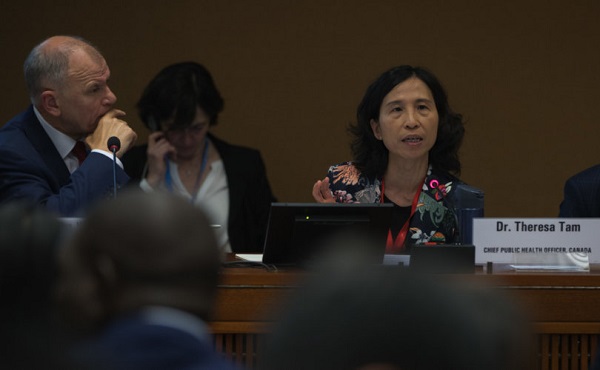
From LifeSiteNews
Dr. Theresa Tam and dozens of managers with the Public Health Agency and Departments of Foreign Affairs, Health, Industry and National Defence signed an oath that prevented them from divulging information related to the COVID crisis
Dozens of Canada’s top health managers and the nation’s top doctor were required to sign a secret oath that prevented them from divulging information relating to the COVID crisis to not “embarrass” the federal government at the time.
Access to Information records show that Dr. Theresa Tam, Canada’s Chief Public Health Officer, and “quite a few” other COVID pandemic managers had to sign the pledge, as noted by Blacklock’s Reporter.
An internal staff email sent in 2020 from Alan Thom, vaccine supply manager with the Public Health Agency, showed he complained that so many managers had to take an oath of secrecy “at a certain point the Department of Public Works determined individual non-disclosure agreements were no longer needed for federal employees as we are all covered through our responsibilities as public servants.”
In total, 29 managers signed the oath with the Public Health Agency and Departments of Foreign Affairs, Health, Industry and National Defence.
The oath came right after the federal government, under former Prime Minister Justin Trudeau, signed a deal to buy mRNA COVID jabs with pharmaceutical companies.
The oath noted, in part, that “Unauthorized disclosure of any confidential information, including but not limited to disclosures or communications to supplier competitors or to the media may result in embarrassment, criticism or claims against Canada and may jeopardize Canada’s supplier relations and procurement processes.”
It continued, stating, “As an employee of the Government of Canada I acknowledge I have read and understood the Values And Ethics Code For The Public Sector,” the pledge stated. “I remain bound by my oath.”
Tam is a strong proponent of the COVID shots. At the peak of the COVID crisis in Canada, the Trudeau government signed about $8 billion in contracts with multiple companies, including, AstraZeneca, Johnson & Johnson, Medicago, Moderna, Novavax, Pfizer and Sanofi.
The first COVID jab to be approved for use in Canada was Pfizer’s BioNTech mRNA injection, which became available on December 9, 2020. Moderna’s mRNA jab followed a couple of weeks later. Of note is the launch of the jabs came after the Trudeau government gave vaccine makers a shield from liability regarding jab-related injuries.
MPs who asked questions to see the contacts were told they were not allowed to view them.
Canada’s Vaccine Injury Support Program (VISP) was launched in December 2020 after the government gave vaccine makers a shield from liability regarding COVID-19 jab-related injuries.
Recently, VISP injury payments are expected to go over budget, according to a Canadian Department of Health memo.
As reported by LifeSiteNews last week, a government-funded inhaled version of the COVID mRNA vaccines developed with abortion-tainted fetal cell lines is now entering Phase 2 clinical trials.
The federal government continues to purchase the COVID shots despite the fact its own data shows that most Canadians are flat-out refusing a COVID booster injection. It also comes as the government has had to increase spending on VISP, as reported by LifeSiteNews last week.
Canadians’ decision to refuse the shots also comes as a Statistic Canada report revealed that deaths from COVID-19 and “unspecified causes” rose after the release of the so-called “safe and effective” jabs.
LifeSiteNews has published an extensive amount of research on the dangers of the experimental COVID mRNA jabs that include heart damage and blood clots.
The mRNA shots have also been linked to a multitude of negative and often severe side effects in children, and all have connections to cell lines derived from aborted babies.
COVID-19
Study finds nearly half of ‘COVID deaths’ had no link to virus

 MxM News
MxM News
Quick Hit:
A groundbreaking new study has delivered a searing indictment of the global health and media establishment’s COVID death narrative. According to Ian Miller’s analysis on OutKick, a thorough investigation into hospital deaths in Greece reveals that nearly half of the cases officially labeled as “COVID deaths” had nothing to do with the virus. The findings undermine years of data used to justify lockdowns, school closures, and vaccine mandates. Miller argues that the so-called scientific consensus pushed by Dr. Anthony Fauci and the media is collapsing under the weight of real evidence.
Key Details:
-
A Greek study found that 45.3% of registered COVID deaths were not caused by COVID at all.
-
Just 25.1% of deaths were directly caused by the virus, with 29.6% contributing indirectly.
-
Only 54.9% of death certificate-listed COVID deaths matched reality after rigorous review.
Diving Deeper:
For years, COVID death tallies dominated media coverage and shaped public policy. Networks like CNN broadcast running totals, while bureaucrats and politicians used them to enforce sweeping restrictions. But according to OutKick’s Ian Miller, a new peer-reviewed Greek study discredits much of that narrative by proving that the way deaths were defined was deeply flawed—and in many cases, outright misleading.
“In Greece, a more concise and simple definition was used, defining as COVID-19-associated death, any death occurring in a person with positive testing for SARS-CoV-2 at the time of death,” the researchers stated. That definition, however, failed to discern whether the virus actually caused the death.
The study, which covered seven major hospitals in Athens over an eight-month period in 2022, went beyond death certificates. Researchers analyzed medical charts, lab results, imaging data, and conducted interviews with treating physicians. As Miller notes, they did “the work that the ‘expert’ community should have been doing” all along.
The findings were stunning. Just 133 of the 530 recorded deaths (25.1%) were directly due to COVID. Another 157 (29.6%) were cases in which COVID contributed to a chain of events. But a full 240 deaths—45.3%—had no connection to the virus, despite being officially registered as COVID deaths.
What’s worse, Miller reports that death certificate data was wildly unreliable. COVID was listed as the primary or contributing cause in 528 out of 530 cases. After the study’s thorough review, that number dropped to 290. “Just 54.9% of the deaths labeled as primary or contributing COVID, per death certificates, actually met that criteria,” Miller writes.
The data also crushed another major narrative: that the unvaccinated were overwhelmingly the ones dying. Of the 290 deaths partially or fully attributed to COVID, 53.8% were fully vaccinated or boosted. In the group labeled “with” COVID, that figure jumped to 63.3%. “Remember the ‘95% of deaths are among the unvaccinated!!!1!!’ hysteria?” Miller quipped. “There was no statistical significance to vaccination when it came to predicting outcomes.”
And perhaps most damning, 42.5% of COVID-positive patients had contracted the virus inside the hospital—despite mandatory masking and PPE policies. “Because masking does not stop COVID transmission,” Miller points out bluntly.
Miller didn’t mince words in his conclusion: “This study quite frankly obliterates almost every single facet of ‘expert’ and scientific consensus. Masking doesn’t work. A significant portion of COVID deaths were not directly caused by the virus… and death certificate data is not reliable.”
As policymakers and media figures continue to sidestep accountability, this study provides hard proof of what many Americans already suspected: the public was misled. And those who raised questions were dismissed as “deniers” or “conspiracy theorists.” In Miller’s view, this was not just a public health failure, but a failure of integrity and truth. And the consequences, from economic devastation to lost trust in institutions, are still being felt.
-

 COVID-192 days ago
COVID-192 days agoStudy finds nearly half of ‘COVID deaths’ had no link to virus
-

 2025 Federal Election2 days ago
2025 Federal Election2 days agoCarney says Liberals won’t make voting pact with NDP
-
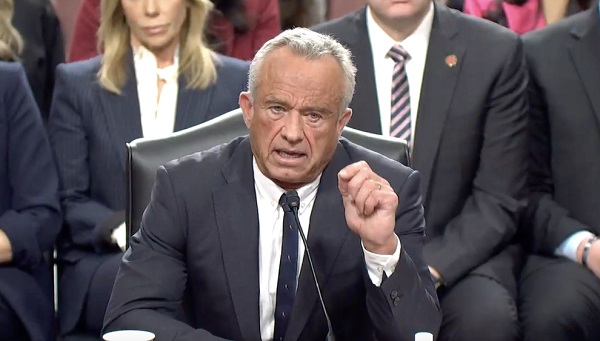
 Autism1 day ago
Autism1 day agoNIH, CMS partner on autism research
-
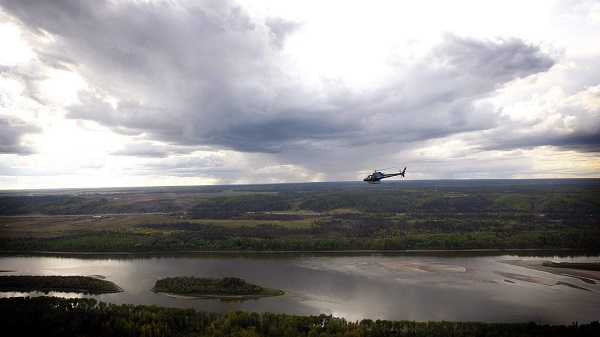
 Alberta2 days ago
Alberta2 days agoEnergy projects occupy less than three per cent of Alberta’s oil sands region, report says
-

 Energy2 days ago
Energy2 days agoOil tankers in Vancouver are loading plenty, but they can load even more
-

 International2 days ago
International2 days agoIce Surprises – Arctic and Antarctic Ice Sheets Are Stabilizing and Growing
-

 Alberta2 days ago
Alberta2 days agoCharges laid in record cocaine seizure
-

 Business1 day ago
Business1 day agoInnovative Solutions Like This Plan To Provide Power For Data Centres Will Drive Natural Gas Demand For Decades
